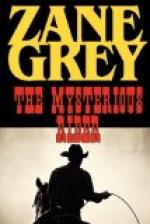* * * * *
Next morning, rather late, Wade rode down to White Slides Ranch. It looked to him like the property of a rich rancher who held to the old and proven customs of his generation. The corrals were new, but their style was old. Wade reflected that it would be hard for rustlers or horse-thieves to steal out of those corrals. A long lane led from the pasture-land, following the brook that ran through the corrals and by the back door of the rambling, comfortable-looking cabin. A cowboy was leading horses across a wide square between the main ranch-house and a cluster of cabins and sheds. He saw the visitor and waited.
“Mornin’,” said Wade, as he rode up.
“Hod do,” replied the cowboy.
Then these two eyed each other, not curiously nor suspiciously, but with that steady, measuring gaze common to Western men.
“My name’s Wade,” said the traveler. “Come from Meeker way. I’m lookin’ for a job with Belllounds.”
“I’m Lem Billings,” replied the other. “Ridin’ fer White Slides fer years. Reckon the boss’ll be glad to take you on.”
“Is he around?”
“Sure. I jest seen him,” replied Billings, as he haltered his horses to a post. “I reckon I ought to give you a hunch.”
“I’d take that as a favor.”
“Wal, we’re short of hands,” said the cowboy. “Jest got the round-up over. Hudson was hurt an’ Wils Moore got crippled. Then the boss’s son has been put on as foreman. Three of the boys quit. Couldn’t stand him. This hyar son of Belllounds is a son-of-a-gun! Me an’ pards of mine, Montana an’ Bludsoe, are stickin’ on—wal, fer reasons thet ain’t egzactly love fer the boss. But Old Bill’s the best of bosses.... Now the hunch is—thet if you git on hyar you’ll hev to do two or three men’s work.”
“Much obliged,” replied Wade. “I don’t shy at that.”
“Wal, git down an’ come in,” added Billings, heartily.
He led the way across the square, around the corner of the ranch-house, and up on a long porch, where the arrangement of chairs and blankets attested to the hand of a woman. The first door was open, and from it issued voices; first a shrill, petulant boy’s complaint, and then a man’s deep, slow, patient reply.
Lem Billings knocked on the door-jamb.
“Wal, what’s wanted?” called Belllounds.
“Boss, thar’s a man wantin’ to see you,” replied Lem.
Heavy steps approached the doorway and it was filled with the large figure of the rancher. Wade remembered Belllounds and saw only a gray difference in years.
“Good mornin’, Lem, an’ good moinin’ to you, stranger,” was the rancher’s greeting, his bold, blue glance, honest and frank and keen, with all his long experience of men, taking Wade in with one flash.
Lem discreetly walked to the end of the porch as another figure, that of the son who resembled the father, filled the doorway, with eyes less kind, bent upon the visitor.




